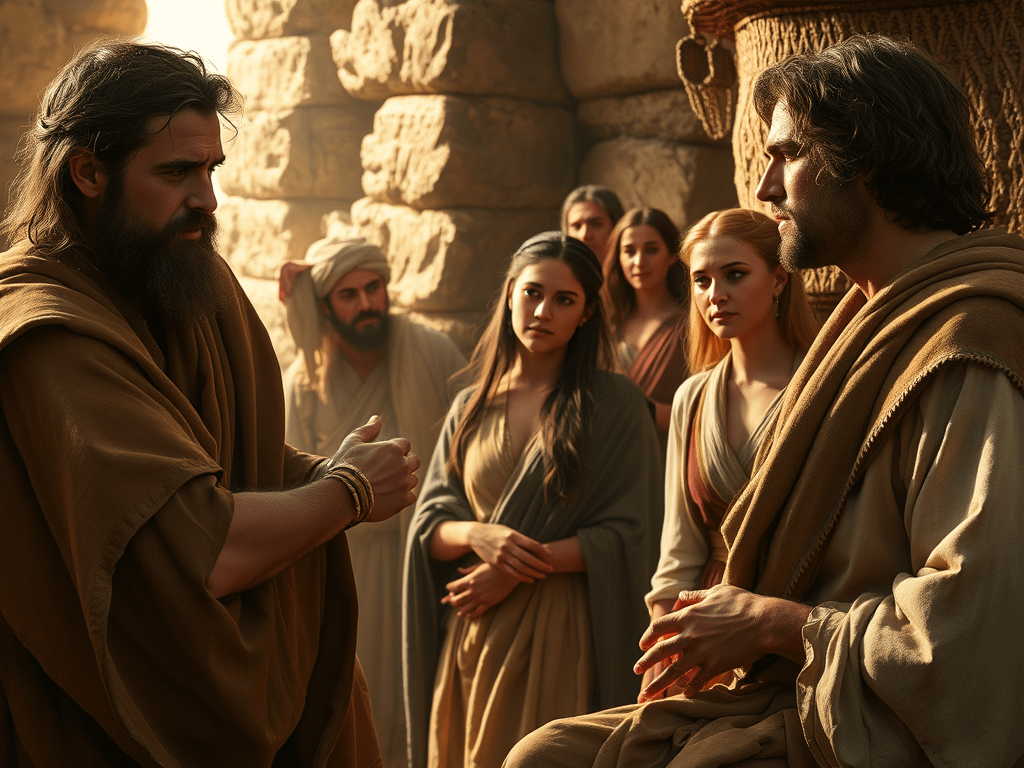Who was Jacob in the Bible?
Who was Jacob in the Bible? What would you do if you found out that one of the key figures in your religious tradition had a life full of complexity, deception, and ultimately transformation?
Jacob, a patriarch in the Bible, offers us a compelling story that sheds light on human nature, divine intervention, and the pursuit of faith. His journey is a narrative of struggle and redemption, one that resonates with many believers to this day.
The Birth of Jacob
Jacob’s story begins with rivalry and prophecy. According to the Bible, Jacob and his brother Esau were the sons of Isaac and Rebekah.
Even before their birth, it was revealed to Rebekah through divine prophecy that the older, Esau, would serve the younger, Jacob.
This unusual oracle set the stage for a life marked by competition and struggle. Jacob was born grasping Esau’s heel, an action that would symbolize his future endeavors to surpass his elder brother.
In a world where birthright and blessing held significant importance, Jacob’s early actions were a sign of his ambitious nature.
Jacob and Esau: A Complex Relationship
Jacob and Esau’s relationship was fraught with tension and deceit from the beginning. The Bible describes Jacob as a quiet man who dwelt in tents, contrasting with Esau, a skillful hunter and man of the field.
This distinction in their personalities played out in their parents’ preferences, with Rebekah favoring Jacob and Isaac favoring Esau.
| Key Event | Jacob’s Role | Impact |
|---|---|---|
| Birthright Sale | Bought Esau’s birthright with a meal | Changed inheritance and power dynamics |
| Deception of Isaac | Disguised himself to receive Isaac’s blessing | Secured the blessing meant for Esau |
| Fleeing to Laban | Escaped to avoid Esau’s wrath | Led to marriage and accumulation of wealth |
| Reunion with Esau | Sought reconciliation | Signified personal transformation |
One pivotal moment between the brothers occurred over a bowl of stew. Esau, returning famished from the field, agreed to sell his birthright to Jacob in exchange for food.
This transaction was momentous, as it inverted the expected future where Esau, as the firstborn, would inherit a double portion of the family wealth. Thus began a sequence of events driven by ambition and deceit.
Jacob’s Deception and Flight
As if securing Esau’s birthright wasn’t enough, Jacob, with the help of his mother, also deceived his father Isaac to receive the blessing meant for Esau.
Disguising himself with goat skins to mimic Esau’s hairy arms, Jacob presented himself to his blind father and received the blessing of the firstborn.
This act of deception had serious consequences, inciting Esau’s wrath to the point where Jacob was forced to flee to his uncle Laban’s household to save his life.
It is not the strongest of the species that survive, nor the most intelligent, but the one most responsive to change.
Life with Laban and the Birth of a Nation
Jacob’s time with Laban was marked by further challenges and growth. Initially arriving destitute, Jacob agreed to work for Laban for seven years to marry his daughter Rachel, the love of his life.
However, Laban tricked him into marrying Leah, Rachel’s elder sister, which led Jacob to work an additional seven years for Rachel.
During this time, Jacob’s family grew, eventually leading to the birth of the twelve tribes of Israel, named after his sons.

The Wrestling Match with God
Perhaps one of the most mysterious and transformative events in Jacob’s life was his encounter with God in the form of a wrestling match. On the eve of reuniting with Esau, Jacob spent a night wrestling with a divine being.
This encounter left him with a limp but also resulted in a new identity: Israel, meaning “he struggles with God.” This pivotal moment in Jacob’s life symbolized his spiritual maturation and readiness to face the challenges ahead.
Reconciliation with Esau
After years of separation and growing wealth, Jacob finally faced his brother Esau. The reunion was filled with tension and anticipation of potential conflict.
However, Esau surprised Jacob with forgiveness and embraces, choosing peace over vengeance. This reconciliation marked a significant turn in Jacob’s journey, highlighting themes of forgiveness and redemption that permeate biblical narratives.
The Legacy of Jacob
Jacob’s story does not conclude with his personal transformation or reconciliation with Esau. Rather, the legacy he left shaped the nation of Israel and reflected in the lives of his descendants.
His twelve sons became the patriarchs of the twelve tribes of Israel, ensuring that Jacob’s influence extended well beyond his lifetime and significantly shaped the religious and cultural history of Judaism.
Conclusion
Jacob’s journey is one of complexity, where divine intervention and personal ambition intersect. While his life was marked by deceit, struggle, and family conflict, it ultimately became a profound narrative of transformation and legacy.
Jacob, who became Israel, continues to be a central figure in the story of the Jewish people, embodying the triumph of divine destiny over human foibles.
FAQ – Dúvidas Comuns
Why did Jacob originally flee his home?
Jacob fled to avoid his brother Esau’s wrath after deceitfully acquiring Isaac’s blessing meant for Esau.
How did Jacob acquire Esau’s birthright?
Jacob bought Esau’s birthright for a bowl of stew when Esau returned exhausted from the fields.
What is the significance of Jacob’s name change to Israel?
Jacob’s name change to Israel signified his spiritual evolution and role as the father of the twelve tribes of Israel.
What trickery did Jacob face while living with Laban?
Laban tricked Jacob by switching his daughters on the wedding night, leading Jacob to marry Leah before marrying Rachel.
How did Jacob’s reunion with Esau unfold?
The reunion was peaceful, with Esau forgiving Jacob, which contrasts with the initial expectation of conflict.







